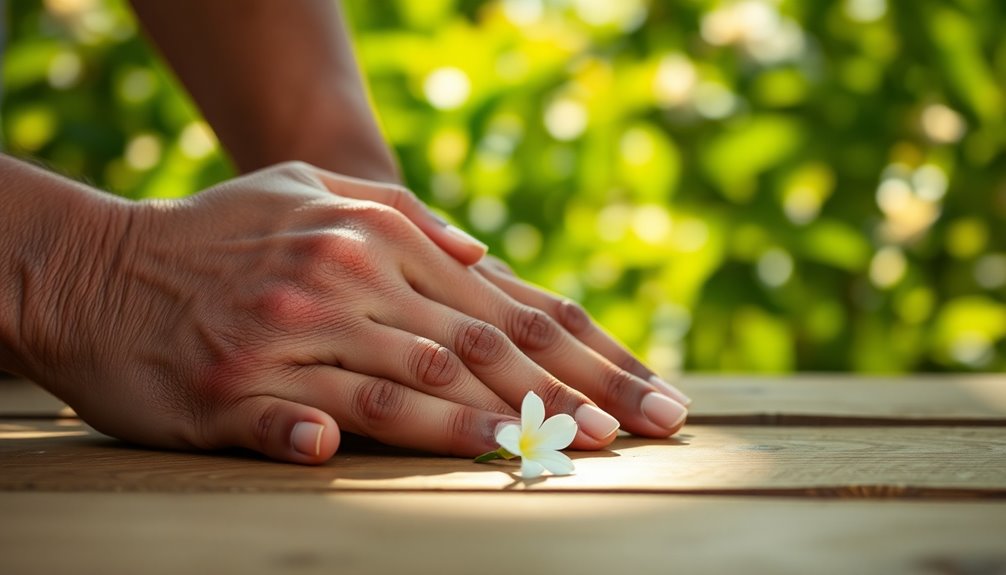Not having an ego anymore means you're embracing a more authentic version of yourself. You've likely recognized the limits of ego-driven validation and are focusing on self-acceptance. This shift promotes deeper, more meaningful relationships built on vulnerability and trust. By cultivating humility and engaging in active listening, you're enhancing your connections with others. Letting go of ego also encourages growth and emotional regulation, leading to inner peace. It's a serious transformation that fosters self-love and community engagement. Stick around to uncover practical steps to further enhance your journey toward a fulfilling, ego-free life.
Understanding Ego and Identity
Ego acts as a lens through which you perceive yourself and the world around you. Your ego perception shapes how you view your strengths, weaknesses, and relationships. It influences your thoughts, feelings, and actions, playing a significant role in identity formation.
When you see yourself through your ego, you often focus on external validation and societal expectations, which can distort your true self. This perception can lead to challenges in understanding who you genuinely are versus who you think you should be. Recognizing that self-worth is inherent can help you detach from ego-driven validation and embrace your true identity. Embracing radical self-acceptance can further assist in this journey by promoting unconditional love for oneself.
To cultivate a healthier sense of identity, it's essential to recognize how your ego influences your perceptions. By becoming aware of its impact, you can start to peel away layers of distortion and connect with your authentic self. Practicing self-compassion and forgiveness can further help you embrace your true identity without the heavy influence of ego.
The Role of Self-Awareness
How can self-awareness transform your relationship with your ego? By practicing self-reflection techniques, you can gain insights into your thoughts and behaviors, allowing you to identify when your ego takes control. This awareness fosters emotional intelligence, helping you understand your emotions and reactions better. As you become more self-aware, you'll notice patterns that reveal how your ego influences decisions and relationships.
Instead of reacting impulsively, you can respond thoughtfully, promoting healthier interactions. This shift doesn't mean suppressing your ego; rather, it's about recognizing its presence and choosing when to engage with it. Additionally, cultivating self-approval can enhance your ability to accept both your strengths and weaknesses, further diminishing the influence of ego-driven responses. Developing coping strategies for stress can also support this process by providing you with tools to manage emotional responses effectively.
Ultimately, self-awareness empowers you to navigate life with intention and authenticity, diminishing the grip of ego-driven responses. Furthermore, embracing self-compassion allows you to treat yourself with kindness, fostering a supportive environment for growth.
Benefits of Letting Go

Letting go of ego-driven attachments can lead to profound personal growth and deeper connections with others.
When you release your ego, you open yourself up to new perspectives and experiences. This ego release allows you to embrace vulnerability, fostering genuine relationships built on trust and understanding. As you nurture friendships, you create a safe space for emotional connections, which enhances your overall life satisfaction. Friendships help regulate mood and alleviate feelings of loneliness, providing essential support during this transformative process.
You'll notice the benefits reflected in your interactions, as you become more empathetic and present. As you let go of the need for validation, you'll find a sense of peace and authenticity within yourself. Engaging in mindfulness practices can further enhance your emotional regulation and support this transformation.
This transformation not only enhances your self-awareness but also helps you engage with the world in a more meaningful way.
Ultimately, freeing yourself from ego can enrich your life and deepen your connections with those around you.
Cultivating Humility
To cultivate humility, you need to embrace self-awareness and recognize how your actions affect others. Letting go of pride opens the door to deeper connections and understanding. Additionally, fostering a sense of quiet confidence can enhance your ability to engage authentically with those around you. Practicing self-compassion allows you to develop a healthier relationship with yourself, ultimately supporting your journey towards humility. Engaging in positive affirmations can further reinforce your self-worth and encourage a mindset of growth and acceptance.
Embracing Self-Awareness
Although it can be challenging, embracing self-awareness is essential for cultivating humility in your life.
By honing your emotional intelligence, you can better understand your thoughts and feelings.
Here are three self-reflection techniques to help you on this journey:
- Journaling: Write down your thoughts and experiences to gain clarity and recognize patterns in your behavior.
- Mindfulness Meditation: Spend time in silence, observing your thoughts without judgment, fostering a deeper connection with yourself.
- Feedback: Seek constructive criticism from others to gain different perspectives on your strengths and weaknesses.
Letting Go of Pride
Pride can often act as a barrier between you and genuine connections with others, making it essential to recognize when it's holding you back. By letting go of pride, you open yourself up to deeper relationships and authentic interactions.
Embracing humility practices, like actively listening and admitting when you're wrong, helps dismantle those pride barriers. You'll find that vulnerability fosters trust and connection, allowing you to relate to others on a more personal level.
Instead of insisting on being right, approach situations with curiosity and a willingness to learn. This shift not only enhances your relationships but also promotes personal growth.
Ultimately, cultivating humility empowers you to connect more deeply and authentically with those around you.
Practicing Gratitude Daily
When you make gratitude a daily practice, you not only shift your focus from what you lack to what you have, but you also cultivate a deeper sense of humility.
By embracing gratitude, you recognize the contributions of others and the abundance around you.
Here are three simple ways to incorporate gratitude into your daily routine:
- Gratitude Journaling: Spend a few minutes each day writing down three things you're thankful for. This helps you reflect on the positives in your life.
- Mindful Appreciation: Take time to appreciate small moments, like a warm cup of coffee or a kind word from a friend.
- Express Thanks: Regularly thank those around you, reinforcing your connections and acknowledging their impact.
These practices can transform your mindset and deepen your humility.
Building Authentic Relationships

Building authentic relationships starts with embracing vulnerability together. When you share your true self, it opens the door for deeper connections. Engaging in activities like volunteering and community involvement can further enhance these relationships by allowing you to bond over shared values and interests. Recognizing different needs is essential to ensure that both you and your partner feel heard and valued. Additionally, practicing active listening can validate feelings and build trust, enhancing emotional support in your relationship.
Embracing Vulnerability Together
Embracing vulnerability together can transform the way you connect with others, fostering authentic relationships that thrive on trust and openness.
When you share your true selves, you invite deeper connections. Here are three ways to embrace vulnerability in your relationships:
- Share Experiences: Open up about your challenges and victories. This creates a foundation of understanding and relatability.
- Offer Mutual Support: Be there for each other during tough times. Supporting one another builds a strong bond that reinforces trust.
- Encourage Honest Conversations: Create a safe space where everyone feels comfortable expressing their feelings and thoughts.
Active Listening Practices
Many people underestimate the power of active listening in forging authentic relationships. By using active listening techniques, you can create a deeper connection with those around you.
Focus on the speaker, maintain eye contact, and avoid interrupting. Reflecting on what they say shows you're engaged and value their thoughts.
When you respond, incorporate empathetic responses to demonstrate understanding. Phrases like "That sounds challenging" or "I can see why you feel that way" can validate their feelings.
This approach not only enhances communication but also fosters trust. Remember, it's not just about hearing words; it's about grasping emotions and intentions.
The Balance of Self and Community
While you might seek personal fulfillment and self-expression, it's essential to recognize the intricate dance between individual desires and the needs of the community.
Striking this balance fosters a stronger community connection and promotes selfless service. Here are three ways to harmonize self and community:
- Engage Actively: Participate in local events or volunteer opportunities to understand community needs.
- Share Your Skills: Use your talents to benefit others, creating a sense of purpose that extends beyond yourself.
- Listen and Adapt: Stay open to feedback from your community, adjusting your contributions to better serve collective interests.
Overcoming Fear of Vulnerability

Building strong connections within your community often requires you to step outside your comfort zone, facing the fear of being vulnerable.
Embracing vulnerability can reveal significant benefits, like deeper relationships and authentic connections. It's natural to fear exploration of your own emotions, but confronting this fear is essential for personal growth.
When you share your thoughts and feelings, you allow others to see the real you, fostering trust and understanding. Remember, vulnerability isn't a weakness; it's a strength that invites support and compassion.
As you become more open, you'll find that others are often willing to reciprocate, leading to a richer, more fulfilling community experience.
Don't let fear hold you back; embrace vulnerability and watch your connections flourish.
Practical Steps to Release Ego
To effectively release your ego, start by cultivating self-awareness and recognizing when your ego influences your thoughts and actions.
Implementing ego detachment techniques can help you shift your perspective. Here are three practical steps to guide you:
- Mindfulness Meditation: Regularly practice mindfulness to observe your thoughts without judgment, allowing you to detach from your ego's narrative.
- Gratitude Journaling: Write down things you're grateful for each day, which shifts your focus from self-centered thoughts to appreciating the world around you.
- Self-Compassion Exercises: Engage in ego reduction practices by treating yourself with kindness and understanding, especially during failures or setbacks.
These steps can help you foster a healthier relationship with yourself and diminish the grip of your ego.
Embracing a Fulfilling Life

Embracing a fulfilling life starts with understanding what truly matters to you. Identify your core values and passions, then align your daily actions with them.
Mindful living plays an essential role; by being present in each moment, you cultivate a deeper appreciation for life's simple joys. This awareness helps you let go of distractions and prioritize what brings you authentic happiness.
Engage in activities that resonate with your true self, and surround yourself with supportive people. It's about finding balance and joy in your relationships, work, and hobbies.
As you embrace this fulfilling approach, you'll discover that life becomes more meaningful. Remember, it's not about the achievements, but the journey toward living in alignment with your values that truly matters.
Conclusion
Letting go of your ego can truly transform your life. Did you know that studies show people who practice humility experience 20% more life satisfaction? By embracing self-awareness and vulnerability, you not only cultivate deeper relationships but also create a sense of balance between your needs and those of your community. As you release your ego, you'll find a more fulfilling life awaits, filled with genuine connections and a profound sense of peace.



